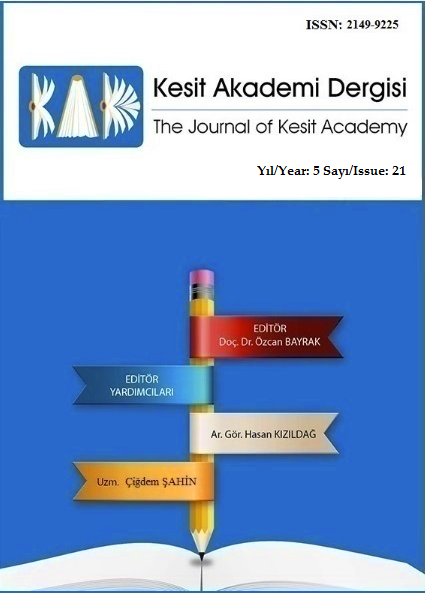Author :
Abstract
Klasik Türk Edebiyatı’nda zahit; âşık, maşuk ve rakip gibi oldukça önemli bir yere sahiptir ve özellikle rint-meşrep şairler tarafından bazı şiirlerde olumsuz bir bakış açısı ile söz konusu edilmektedir. Bu çalışmada Klasik Türk Edebiyatı’nda zahide dair bir unsur olarak tespihin riyakârlık göstergesi şeklinde kullanımı konu edilmiştir. Çalışmamızın amacı divan şiirinde zahit karakterinin tespihi riyakârlık bağlamında kullandığı ifade edilen beyitleri tespit etmek ve bu bağlamda değerlendirmelerde bulunmaktır. Bu sayede rint-meşrep şairler tarafından elinde tespihi ile riyakâr olarak telakki edilen zahide karşı divan şairinin bakış açısı ortaya konulacaktır. Bu bağlamda Klasik Türk Edebiyatı’nda farklı yüzyıllardan 100’den fazla divan incelenerek divan şiirinde zahide dair bir unsur olarak tespihin riyakârlık sembolü olarak görüldüğü beyitler tespit edilmiştir. Çalışmamıza aynı beyit içerisinde zahit, tespih, riyakârlık vb. unsurların bir arada bulunduğu beyitler dahil edilmiştir. Bu çalışma ile divan şiirinde zahit tipinin tespihi riyakârlık sembolü olarak bulundurması ve böylece halkın dinî duygularını suistimal etmesi üzerine tespit ve değerlendirmelerde bulunulmuştur.
Keywords
Abstract
Zahit has a quite important place like lover, beloved and rival in Classical Turkish Literature and especially have been expressed with a negative perspective by rint-meşrep poets in some poems. In this study, using as hypocrisy indicator of rosary as an element of zahit is subjected in Classical Turkish Literature. The aim of our study is to determine the couplets that are expressed to use the rosary in the context of hypocrisy by zahit character in divan poetry and to make evaluations in this context. In this way, the point of view of the divan poet will be revelead against the zahit who is considered by the rint-meşrep poets as a hypocrite with the rosary in his hand. In this context, more than 100 divans of classical Turkish literature have been examined and couplets have been identified in which rosary is seen as a symbol of hypocrisy. In the same couplet zahit, rosary, hypocrisy etc. couplets containing elements are included to our study. In this study are made determinations and evaluations about zahit type’s possession as a symbol of hypocrisy the rosary and thus abuse the religious feelings of the people in the divan poetry.
Keywords
- Ak, C. (2001), Bağdatlı Rûhî Dîvânı Karşılaştırmalı Metin. C: 1-2. Bursa: Uludağ Üniversitesi Yayınları.
- Akkuş, M. (1993), Nef’î Dîvânı, Ankara: Akçağ Yayınları.
- Aksoyak, İ. H. (2018), Gelibolulu Mustafa Âlî-Divanlar, Ankara: T.C. Kültür ve Turizm Bakanlı- ğı Kütüphaneler ve Yayımlar Genel Müdürlüğü (e-kitap).
- Ayan, H. (1990), Nesimî Divanı, Ankara: Akçağ Yayınları.
- Aydın, H. (2010), Cevri Divanının Tahlili, Yayımlanmamış Doktora Tezi, Balıkesir Üniversitesi Sosyal Bilimler Enstitüsü, Balıkesir.
- Bayak, C. (2017), Sehâbî Dîvânı, İnceleme-Metin, Ankara: T.C. Kültür ve Turizm Bakanlığı Kü- tüphaneler ve Yayımlar Genel Müdürlüğü (e-kitap).
- Bilkan, A. F. (2011), Nâbî Dîvânı, b.2., C.2, Ankara: Akçağ Yayınları.
- Çeltik, H. (2017), Ahmed-i Rıdvan Divanı, Ankara: T.C. Kültür ve Turizm Bakanlığı Kütüphane- ler ve Yayımlar Genel Müdürlüğü (e-kitap).
- Demir, H. (2017), Lâzikîzâde Feyzullah Nâfiz ve Dîvânı, Ankara: T.C. Kültür ve Turizm Bakan- lığı Kütüphaneler ve Yayımlar Genel Müdürlüğü (e-kitap).
- Demirci, K. (2011), Tesbih, Diyanet İslam Ansiklopedisi, C.40., s.532-533.
- Devellioğlu, F. (2005), Osmanlıca-Türkçe Ansiklopedik Lûgat, (Yayıma Hazırlayan: Aydın Sami Güneyçal), b.22, Ankara: Aydın Kitabevi.
- Ertem, R. (1995), Şeyhülislâm Yahyâ Dîvânı, Ankara: Akçağ Yayınları.
- Gök, S. (2017), Hayreti Divanı Sözlüğü *Bağlamlı Dizin ve İşlevsel Sözlük+, Yayımlanmamış Doktora Tezi, Gazi Üniversitesi Sosyal Bilimler Enstitüsü, Ankara.
- Gürgendereli, M. (2017), Mostarlı Hasan Ziyâ’î Divânı, Ankara: T.C. Kültür ve Turizm Bakanlığı Kütüphaneler ve Yayımlar Genel Müdürlüğü (e-kitap).
- Karagöz, H. (1997), Askerî Dîvânı’nın Tenkitli Metni, Yayımlanmamış Yüksek Lisans Tezi, Sü- leyman Demirel Üniversitesi Sosyal Bilimler Enstitüsü Türk Dili ve Edebiyatı Anabilim Dalı, Isparta.
- Karaköse, S. (2017), Nev’î-zâde Atâyî Dîvânı, Ankara: T.C. Kültür ve Turizm Bakanlığı Kütüp- haneler ve Yayımlar Genel Müdürlüğü (e-kitap).
- Kavruk, H. ve Selçuk, B. (2009), Filibeli Vecdî ve Dîvân’ı (Metin-Dizin), Malatya: T.C. Kültür ve Turizm Bakanlığı Kütüphaneler ve Yayımlar Genel Müdürlüğü (e-kitap).
- Kaya, B. A. (2017), Azmizâde Hâletî Dîvânı, Ankara: T.C. Kültür ve Turizm Bakanlığı Kütüpha- neler ve Yayımlar Genel Müdürlüğü (e-kitap).
- Kazan Nas, Ş. (2018), Celilî Divânı (İnceleme-Metin), Ankara: T.C. Kültür ve Turizm Bakanlığı
- Küçük, S. (1994), Bâkî Dîvânı-Tenkitli Basım, Ankara: Atatürk Kültür, Dil ve Tarih Yüksek Ku- rumu.
- Külekçi, N. (1985), Gânî-zâde Nâdirî: Hayatı, Edebi Kişiliği, Eserleri, Divanı ve Şehnâme'sinin Tenkidli Metni, Kısmen Yayımlanmış Doktora Tezi, Atatürk Üniversitesi Fen-Edebiyat Fakültesi Türk Dili ve Edebiyatı Bölümü, Erzurum.
- Macit, M. (2012), Nedîm Divânı, Ankara: T.C. Kültür ve Turizm Bakanlığı Kütüphaneler ve Yayımlar Genel Müdürlüğü (e-kitap).
- Mermer, A. (1991), Mezâkî: Hayatı, Edebî Kişiliği ve Divanının Tenkidli Metni, Ankara: Atatürk Kültür, Dil ve Tarih Kurumu.
- Okur, M. (2006), Divan-ı Vâlî-i Amedî, Hayatı, Eserleri, Edebi Kişiliği, Yayımlanmamış Yüksek Lisans Tezi, Afyon Kocatepe Üniversitesi Sosyal Bilimler Enstitüsü, Afyon.
- Pala, İ. (2015), Ansiklopedik Divan Şiiri Sözlüğü, b. 15, İstanbul: Kapı Yayınları.
- Saraç, M. A. Y. (2002), Emrî Divanı, İstanbul: Eren Yayıncılık
- Şahinoğlu, A. (1997), Zati Divanı’ndaki Soyut Kavramlar (Gazeller Kısmı), Yayımlanmamış Yüksek Lisans Tezi, İstanbul Üniversitesi Sosyal Bilimler Enstitüsü, İstanbul.
- Tarlan, A. N. (1992b), Ahmet Paşa Divanı, Ankara: Akçağ Yayınları.
- Tarlan, A. N. (1992c), Hayâlî Divanı, Ankara: Akçağ Yayınları.
- Tatçı, M. (2005), Yûnus Emre Divân ve Risâletü’n-Nushiyye, İstanbul: Sahhaflar Kitap Sarayı.
- Tekin, K. H. (2014), ‚Türk-İslam Sanatında Tesbih Üzerine Notlar‛, Turkish Studies, International Periodical for the Languages, Literature and History of Turkish or Turkic, Volume 9/10 Fall, p. 1009-1018 , TURKEY.
- Tuncer, E. (2016), Sükkerî Divanı Sözlüğü *Bağlamlı Dizin ve İşlevsel Sözlük+, Yayımlanmamış Yüksek Lisans Tezi, Eskişehir Osmangazi Üniversitesi Sosyal Bilimler Enstitüsü, Eskişehir.
- Türkçe Sözlük (2009), Hzl.: Halük Şükrü Akalın, b.10, Ankara: Türk Dil Kurumu
- Üst, S. (2018), Edirneli Nazmî Dîvânı, Ankara: T.C. Kültür ve Turizm Bakanlığı Kütüphaneler ve Yayımlar Genel Müdürlüğü (e-kitap).
- Üstüner, K. (2017), Enderunlu Hasan Yâver: Divan, Ankara: T.C. Kültür ve Turizm Bakanlığı
- Yenikale, A. (2011), Sünbül-zâde Vehbî, Dîvân, Kahramanmaraş: Ukde Yayınları.
- Yılmaz, K. H. (2012), ‚Divan Şiirinde Tesbihe Dair‛, Turkish Studies, International Periodical for the Languages, Literature and History of Turkish or Turkic, Volume 7/1 Winter, p. 2131-2144, TURKEY.





